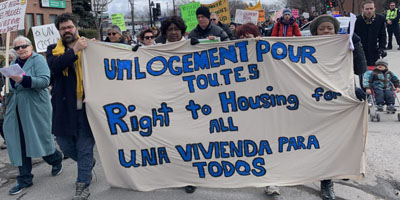Montreal’s rent prices are rising at unprecedented rates and the supply of affordable rental units in the city is declining drastically. Thousands of Montrealers, particularly those in lower income brackets and more in need of affordable housing, are left in precarious positions. A growing demand for housing, increasing construction costs, and exploitative landlord practices are factors that contribute to rising rent prices and the subsequent diminishing supply of affordable housing.
I spoke with experts and advocates in Montreal’s housing sector to get their takes on the city’s ongoing housing crisis and the steps they believe need to be taken to tackle this crisis.
What is ‘affordable’ housing?
On June 21, 2019, the Canadian government passed the National Housing Strategy Act (NHSA) which formally recognized housing as a ‘fundamental human right.’ The act also declared Canada’s commitment to ensuring access to adequate, suitable, and affordable housing for all Canadians, particularly those in greater need. Given this watershed federal declaration and the city’s ongoing crisis, it is clear that the concept of affordability is crucial to understanding the present situation in Montreal.

Catherine Lussier is a long-time member and spokesperson of the Quebec housing rights advocacy organisation FRAPRU (Le Front d’action populaire en réaménagement urbain). Since its founding in 1978, FRAPRU has consistently lobbied for tighter government regulation on Quebec’s housing markets to ensure that the ‘essential good’ of housing is equally accessible to all. Lussier told me about how the Canada Mortgage and Housing Corporation (CMHC), the national housing agency, considers affordability, and what it means in practice.
“They consider thirty percent of the total income to be affordable,” she says. That is, less than 30% of a household’s before-tax income. One problem with this, she said, is that it does not account for people in different income brackets.
“They make no differences between landlords, tenants, no differences between someone that has a salary as a doctor and according to someone that is, you know, paid for working in a McDonald’s. There’s no difference at all in their calculation.”

Michel Monette is the co-founder of CARE Montreal, a shelter that provides aid to Montrealers facing homelessness and housing insecurity. He expanded on the logic behind this definition of affordability.
“Let’s say someone that is on social welfare gets $700 a month. If you’re a single man and you go on social welfare, that’s $700 or $750 per month. Apartments right now in Montreal that are less than $700 are very few. So, if you put like 90% or 100% of your income on apartments, how do you eat? How do you pay for the rest? How do you have a social life?”
Lussier also spoke about how other federal, provincial, and municipal programs aimed at tackling housing have their own definitions of affordability. “It’s really lacking a coherent definition. Sometimes the definition is based on prices on the market. So, they will consider like 10% or 20% less than the prices on the market as affordable. So, if I’m thinking about Ville-Marie [the borough that includes downtown area], where the prices are really high, if you calculate 90% of that, that price is still too high for most tenants.”
Raphaël Fischler, dean of the Faculty of Planning at the Université de Montréal, readily summed up the problem of assuming unidimensional understandings of affordability. “The problem of housing affordability is a very different problem for people at different locations in the ladder of incomes, and the housing crisis is really one that affects people at the lower end of the ladder.”

Rising prices
This past June, the Regroupement des Comités Logements et Associations de Tenants du Québec (RCLALQ), a tenants rights advocacy group, released the third edition of their annual report on Quebec’s rental market. The study showcased trends in rental prices around the province by analyzing rental listings posted on websites like Kijiji, Rentals.ca, and Zumper. This year’s study found that the average rental prices in Quebec were 49% higher than median rents reported by the CMHC.
A key driver of behind the present crisis of affordability has been the steep rise in rental prices across Montreal and Quebec. Data from Statistics Canada and the CPI shows that spending on housing has increased at a faster rate than spending on any other consumer goods across Canada over recent years. Fischler says that over the long term, steadily rising housing prices are a natural trend that result from general economic growth.
“We have had many years of steady economic growth, which has created a stronger demand for housing: with higher incomes, more people can live on their own instead of sharing housing, more people can enter the ownership market, etc.” Fischler explained.
However, the recent spike in prices has been indicative of deeper structural shocks to the city’s housing markets, according to Jean-Pierre Racette, the director general of the Société d’habitation populaire de l’Est de Montréal, a non-profit housing organization dedicated to creating inclusive and affordable social housing.

“At the economic level, there is a shortage of labour, then a shortage of building materials,” Racette said. “There is a shortage risk from having the price of gasoline going up because of the war in Ukraine, so the costs have more than doubled to build and it is expensive to build the housing.” (Our conversation was in French; I’ve translated his comments.)
Fischler also noted the economic context for new housing. “Construction costs have increased very rapidly in recent years as builders compete for materials and labour, and the disruption to labour markets and supply chains that the pandemic brought about has further worsened things.”
Further studies have also attributed increasing costs to broader post-pandemic inflation across all household goods, as well as an increase in rent-increasing strategies by landlords across the city such as rent hikes and ‘renovictions’ – a colloquial term used to describe the practice of evicting tenants in order to renovate the newly vacant unit and raise its price to receive higher rents from future tenants. FRAPRU’s Lussier says that these practices push tenants out of units unfairly, leaving them in precarious positions.
The role of the private market
Private developers have always been the biggest player in Montreal’s housing market, building most of the city’s housing units. Their role is key in the trends in the housing market that we observe today. The post-pandemic jump in the costs of housing production, paired with the profit-seeking of the builders, makes it difficult for the private market to produce affordable units for low-income people.
“Policymakers rely a lot on the private market to help supply more affordable units,” Fischler said. “But given the high constructions costs, the high land values, and the large profits to be made, the private sector simply cannot build cheap housing.”
This in turn brings increased rental prices. Lussier says this is because of the incompatibility of the private sector and the supply of affordable housing in the city.
“Private developers want to invest because they want to acquire as much profit as possible. So we’re not developing a city because we need to, you know, build housing for people to live in the city, but more just to acquire as much as possible profit.”
This is reflective of FRAPRU’s general position on the private sector’s dominant role in Quebec’s housing market today. The organization believes the private market to be ‘structurally incapable’ of supplying affordable housing units that ‘that are accessible to all’ due to its speculative approach to housing development and its aim of profit seeking.
Potential solutions going forward
With a deeper understanding of the driving forces behind the crisis of affordability today, I asked about potential solutions to the crisis. Lussier and FRAPRU argue that there needs to be immediate government policy controls on rent practices and the power of private developers.
“The Quebec government has a real responsibility to better control the rents, better control evictions, better control the repossession of dwellings, and truly punish landlords that are using illegal tactics.”
She argues that current policies aimed at protecting tenants from potential rent abuse – such as controls on the amount by which landlords can raise rents, the buffer period needed for tenants to adjust, and laws forbidding unjustified evictions – are not strictly enforced and adhered to in practice.
Lussier is also firm on the point that if Montreal is to see an increase in its amount of affordable units, the city cannot continue to rely as heavily on the private sector to construct new housing units as it does now.
“If we truly want to support lower income households, then we have to develop an alternative to the private sector,” she said, adding that the Quebec government in the last four years has only invested in developing five hundred new units. Considering that there are around 244,000 tenants who pay more than 30% of their income on too-small apartments, she calls for the government to invest in social housing units rather than subsidizing private developers.
Fischler agrees that any solutions to the crisis will require significant government financing. To him, such financing can take three different forms.
“The most effective approach is the most expensive one, investing public funds in the production of housing.” This could be by building social housing, by subsidizing non-profit builders, by subsidizing for-profit builders or by funding support to people seeking housing in the private market.
In Fischler’s view, the private sector can and should still play an important role in Montreal’s housing market. He believes that private developers can contribute to the struggle for affordable housing as long as their contribution is paired with strong regulation and further investment in the public sector.
“The role of private developers should not be discounted. They can help to improve the situation by increasing the supply of housing, including somewhat affordable housing. But we need much, much more than the private sector.”
Racette’s position is similar to Fischler’s, as he states that while further government investment into public social housing units and non-profit organizations that build community housing units is crucial, the private sector also needs to be included in the process. The interaction between the two sectors, for him, is complementary as each sector addresses particular issues that their counterpart may miss.
“There have to be several players with different dynamics,” he told me. “We are very entrepreneurial, the state less, so there are constraints. Each player has constraints. In financial terms, we don’t have the means of the state, but we are much more flexible. We are able to find solutions to problems that come up that the state will not be able to.”
Photos of individuals are from Linkedin profiles or from web sites of affiliate organizations. The protest photo is from the FRAPRU site.



